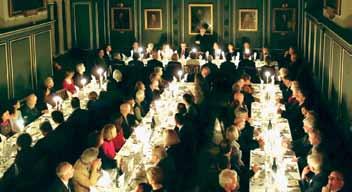
2 minute read
Celebrating 100 Years of Archaeology & Anthropology at Cambridge – In Magdalene
By Dr Simon Stoddart (1977)
451 delegates from around the world attended the Centenary celebration of the establishment of the Archaeology and Anthropology degree at the University of Cambridge, and the Cripps complex of Magdalene was chosen as the principal location.
The day spent in Magdalene (28th February) was, in fact the largest occasion ever held in the new complex, or who have dined simultaneously by candlelight in College, bringing more people together than ever, even more than on the day that Seamus Heaney memorably spoke in the same auditorium.
Seamus Heaney’s theme of that earlier day, Bog Bodies, had a redolent linkage to Arch and Anth, as Simon Stoddart pointed out in his welcome; the bodies of Biological Anthropology, the strangeness of Social Anthropology and the excavation metaphor of Archaeology.
Archaeology has been a long-term focus of Magdalene’s contribution to Arch and Anth, underwriting its top examination performance over the last ten years, but also contributing major figures such as Sir Cyril Fox (1882–1967), Eric Higgs (1908–1976) and Lawrence Barfield (1935–2009) for landscape archaeology, ancient animal husbandry and Italian archaeology respectively over the full hundred years. The Museum of Archaeology and Anthropology, an institution which represents all three disciplines, was well represented by Magdalene on the previous evening when Max Hebditch, formerly of the Museum of London, and Malcolm McLeod, formerly of the British Museum and Glasgow Museum, spoke for the College and the disciplines of Archaeology and Social Anthropology respectively. Malcolm McCleod also made the important connection to Africa which again features strongly in the Magdalene tradition of Arch and Anth, including William Fagg from the field of Social Anthropology in the 1950s and 1960s, Keith Ray from the field of archaeology in 1980s, and currently Tim Clutton Brock, originating from the field of Biological Anthropology, now working on social behaviour of meerkats.
This African tradition links three subjects in the study of the foundations of global humanity clearly rooted in the African continent. The Master, Rowan Williams, focused on this key element of the Arch and Anth degree in his speech at the dinner in hall.
He linked the degree to the figure of Nelson Mandela and the campaign to raise money for African students and for a professorship in African Archaeology, celebrating the single origin of humanity.
The Master went on to relate how a relatively small subject had had a disproportionately large influence on related fields: “In a world where it is easy to polarize between humanities and sciences, which can sometimes cripple intellectual adventurousness, here is a field of study which has managed to weave them together with colossal creativity.”
Members of the College who wish to see this interdisciplinary subject in action are invited to join the University of Cambridge alumni field visit to Malta, in one of the closest corners of Europe to Africa, led by the Archaeology fellow in College, Dr Simon Stoddart. www.alumni.cam.ac.uk/travel/malta-and-gozo
www.magd.cam.ac.uk









